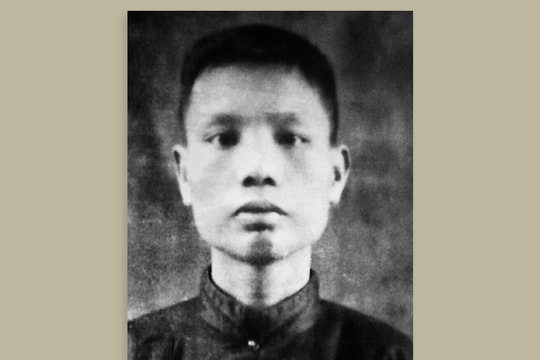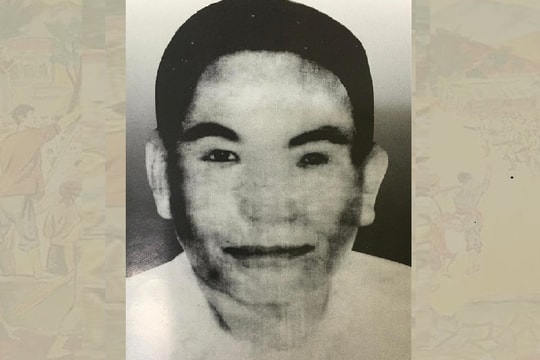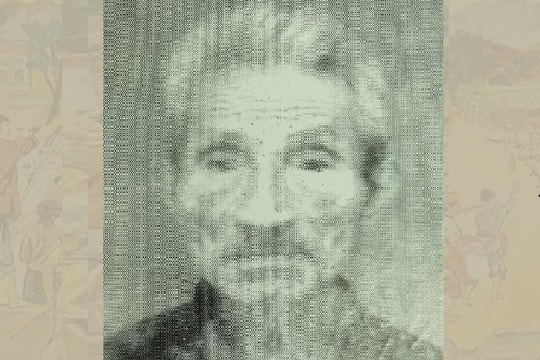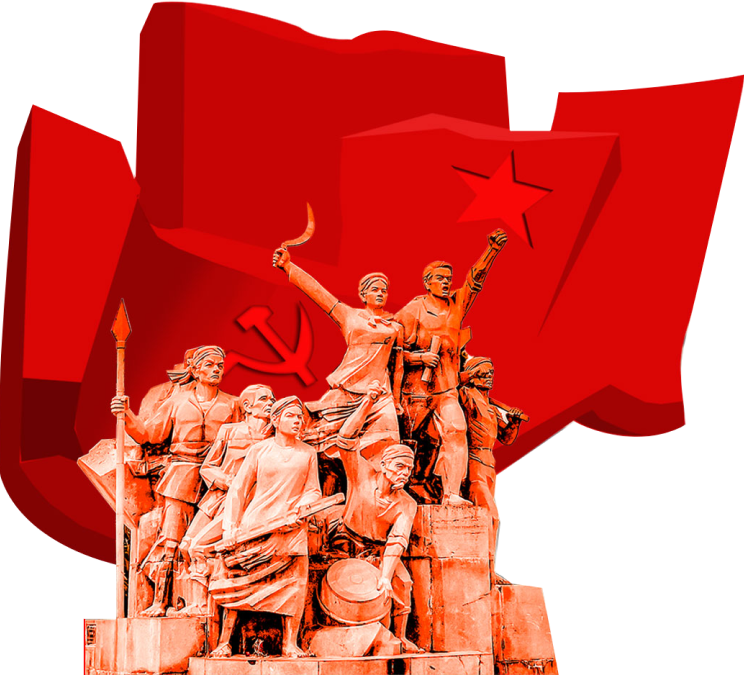Comrade Tran Huu Doanh (1906-1945): Devoted his whole life to the glorious revolutionary cause of the Party
Tran Huu Doanh, alias Dinh, Phi, Doanh, was born in 1906 in Tho Son village, Cat Ngan commune, Cat Ngan canton, now Cat Van commune, Thanh Chuong district, Nghe An province.
On December 5, 1942, at Dak Min prison, Buon Ma Thuot, there was a prison break of 4 communist prisoners from Nghe Tinh. The French colonialists and the puppet government in Central Vietnam mobilized many soldiers to sweep the forests around Buon Ma Thuot, spread nets to block the roads from the Central Highlands to Nghe Tinh in order to capture the escaped prisoners. They also posted a notice offering a reward of 300 dong for each prisoner and ordered the village chiefs in Nghe Tinh to capture them in their hometowns. But all of the enemy's tricks were ineffective. Our 4 soldiers, although their bodies were weak after nearly 10 years of imprisonment, with extraordinary determination, they carved their own way through the forest, bravely fought against diseases, wild animals, hunger, and lack of salt, passed hundreds of enemy guard posts and stations, returned to the people and the Party, and continued their activities. One of the 4 steadfast communist soldiers was Tran Huu Doanh.
Tran Huu Doanh's maternal grandfather was Gian Tu Sat, an honest and outspoken Confucian scholar. Heartbroken by the French invasion of his country and the enslavement of his people, he quit his teaching job and joined Phan Dinh Phung's Can Vuong army in the mountains. He was appointed to command about 30 insurgents, so the people in the area often called him Quan Sat. When the uprising was suppressed by the French, he was captured and died heroically in his homeland.
Tran Huu Doanh's father was Tran Huu Hoang, his mother was Gian Thi Chuan, often called Mrs. Man. Both of them were patriotic, hated the French, hated local tyrants and were willing to support righteous causes. They had 5 children, 3 boys and 2 girls, all 5 of them participated in revolutionary activities from the early days of the Party's establishment, of which 3 were communist party members.
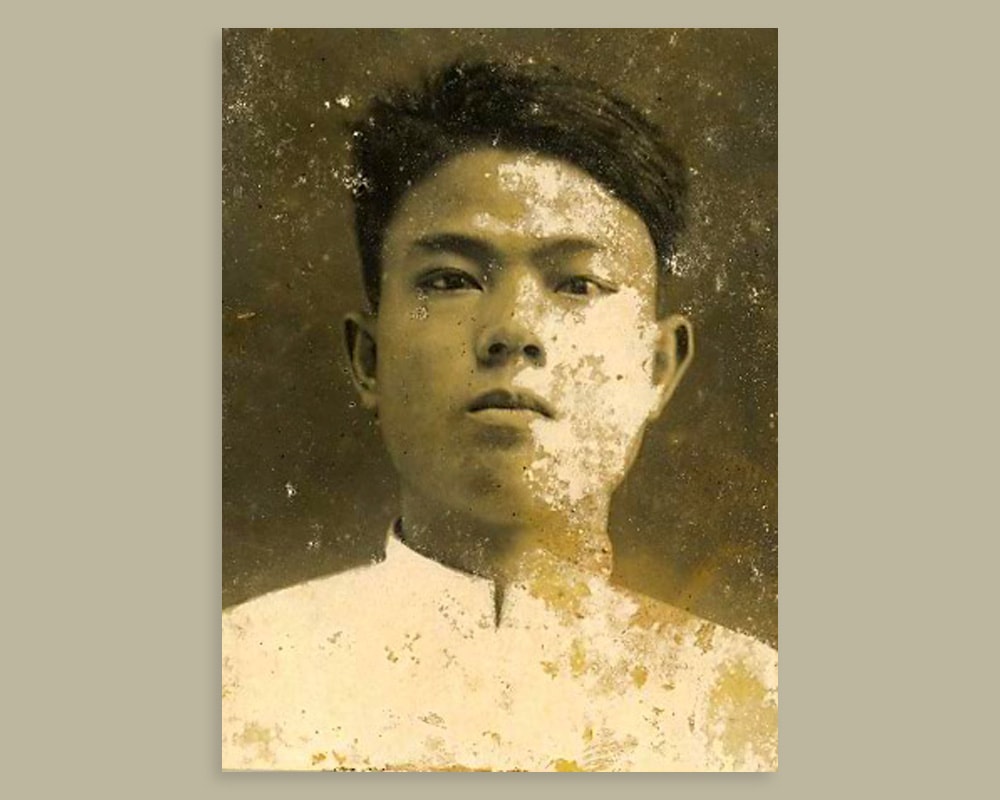
Tran Huu Doanh was the fourth child in the family. As a child, his parents gave him a thorough education. At the age of 19, Tran Huu Doanh graduated from primary school and passed the entrance exam to Vinh National School. At that time, it was 1925, Vinh town was experiencing a fervent patriotic movement initiated by the Phuc Viet Association. At the National School, many students were children of families whose fathers participated in the Can Vuong movement... They were no longer interested in studying but often discussed the future of the country and of the youth. They secretly read to each other the passionate poems of Phan Boi Chau and patriotic scholars. They satirized and criticized the French colonialists' policy of educating ignorant people.
Living in an environment favorable for the development of noble feelings, Tran Huu Doanh quickly absorbed new things through the conversations of his friends and the patriotic movement of the Vinh - Ben Thuy masses. He eagerly went to listen to the speeches of teachers Ha Huy Tap and Tran Dinh Thanh at the Quang Tri meeting hall. He actively participated in the struggles of students demanding that the school: "abolish the unreasonable ban on dormitories", "allow dormitory students to go out on Saturday afternoons and Sundays."
Through some friends who were in the Phuc Viet group of Quoc Hoc school such as Nguyen Tiem and Pham Huy Thuong, Tran Huu Doanh was able to meet teacher Ha Huy Tap, a cadre of the Phuc Viet Association. Being close to and enlightened by teacher Ha Huy Tap, Tran Huu Doanh learned more about the patriotic organization Phuc Viet, understood the training of "noble character of a citizen" and "will of a revolutionary". Together with his progressive classmates at Quoc Hoc school, Tran Huu Doanh was admitted into the Sinh Doan organization of the Phuc Viet Association.
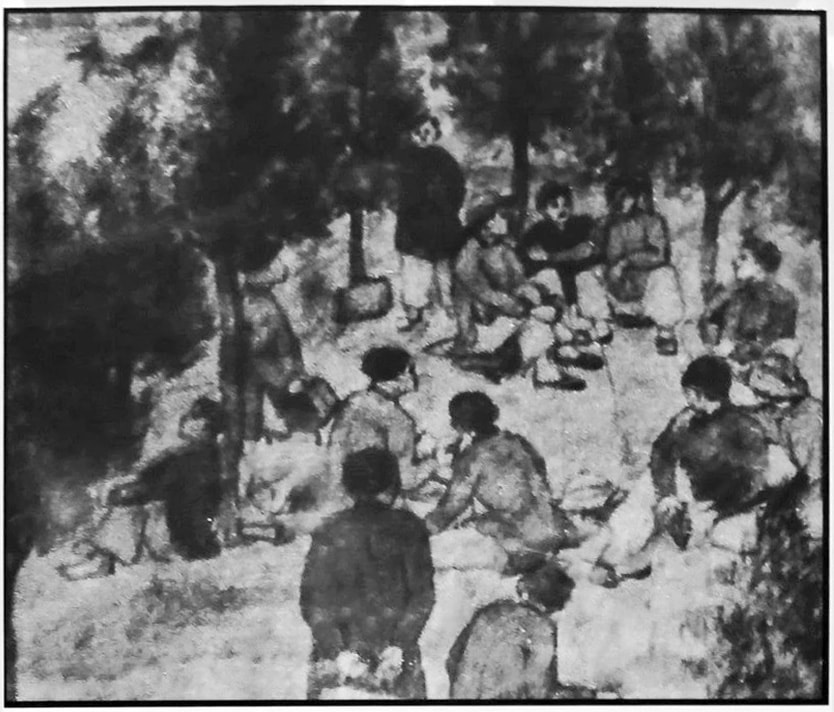
In 1926, thanks to the efforts of the Phuc Viet sub-groups, the student movement developed quite extensively. Tran Huu Doanh was one of the core students of the Sinh Doan organization. After a period of activity, Tran Huu Doanh was admitted to the Phuc Viet Association.
In the summer of 1926, Tran Huu Doanh invited teacher Ha Huy Tap to visit his hometown. To facilitate the construction of the Association's base in Cat Ngan, they opened a class to teach the national language to the youth in the area, using the class to gather the masses and propagate the Association's policies. Teacher Tap was the main teacher, Tran Huu Doanh was the assistant teacher, helping to organize the class, traveling to places to make contacts, and buying books and newspapers.
Thanks to many former members of the same association and guild who had “lived and died together” during the rock-throwing festival at Treo Hill on the 5th of May (Lunar calendar) every year, Tran Huu Doanh sometimes met each person privately to chat, sometimes invited his friends to his house to drink green tea and listen to Master Tap discuss current events. Sometimes he gathered dozens of people to read books and give lectures at Con Market (Cat Ngan). In just a few months, under the guidance of Ha Huy Tap, Tran Huu Doanh was able to organize a Phuc Viet sub-group in Cat Ngan.
During this time, the local tyrants in Tho Son were planning to cede the village's alluvial land along the Lam River to some pro-French elements. Faced with this situation, the Phuc Viet Cat Ngan sub-group mobilized hundreds of farmers to go to the village hall, expose the tyrants who took bribes from the bad guys, and keep the entire Tho Son alluvial land, the core of the village's land. The struggle was victorious, and the reputation of the Phuc Viet sub-group led by Tran Huu Doanh was further consolidated.
In 1927, a new event took place within the patriots in Nghe An, which had a great influence on the direction of the Phuc Viet Association's activities. That was, in addition to the Phuc Viet organization, the Vietnam Revolutionary Youth Association (ie the Youth Association) began to appear. This new revolutionary organization was built by a number of cadres who returned from abroad. Important documents such as the Thanh Nien weekly and Nhan Dao newspaper transferred by the Association had a special attraction to the progressive party members in the Phuc Viet Association.
Tran Huu Doanh went to Da Van to meet comrades Nguyen Canh Don and Nguyen Si Doan, then went down to Vinh to meet the comrades.Nguyen Tiem, Pham Huy Thuong to inquire about the situation. After examining the specific activities of the Youth Association branches, realizing that this was a more progressive revolutionary organization than the Phuc Viet organization, Tran Huu Doanh decided to completely transfer to the Youth Association. This was an important turning point in every step of his activities. Among the Phuc Viet members in Cat Ngan, there were 2 people who agreed to transfer to the Youth Association. Tran Huu Doanh, together with those 2 enthusiastic young men, established a Youth Association branch.
For the members of the Phuc Viet Association who did not transfer to the Youth Association, Tran Huu Doanh still patiently waited and believed that sooner or later the active comrades of the Phuc Viet Association would follow the revolutionary path of the Youth Association. Tran Huu Doanh's attitude created favorable conditions for the Cat Ngan Youth Association branch to operate, maintaining a close connection between the Phuc Viet members and the patriotic masses. Gradually, the Phuc Viet members in Cat Ngan also operated in the direction of the Youth Association.
With the help of the leaders of the Youth Association in Nghe An, Tran Huu Doanh and the Cat Ngan Youth Association branch mobilized more than 30 youths in the commune to organize a Plowing Camp in Khe Truong. In addition to reclaiming land, planting tea and potatoes, the camp organized for the brothers to read books and newspapers, practice martial arts. Some youth cadres from Vinh were welcomed here to propagate communism and implement the slogan "old farmers". On the hills and valleys, which used to be the camps and training grounds of the Can Vuong insurgents, of the Quyen and Quang teams, now became the base of the Cat Ngan Youth Association branch. The youths at the Khe Truong Plowing Camp were the core force in mobilizing people to repair roads, fight against corrupt local officials, and eliminate superstition. The development of the movement required a more suitable organization. In early November 1929, Tran Huu Doanh was contacted by Nguyen Canh Don and Nguyen Si Doan from the Indochinese Communist Party cell in Da Van, Anh Son. These comrades, on behalf of the organization, transformed the Cat Ngan Youth Association cell into a cell of the Indochinese Communist Party. Comrade Tran Huu Doanh was appointed as the cell secretary.
Worried about his new mission, he quickly relied on existing mass organizations, establishing Farmer Association groups in the villages of Tho Son, Van Ba, and Bai Thien. He took advantage of every moment to study the Manifesto of the Indochinese Communist Party. From Cat Ngan, he expanded his activities with communist groups in Duong Xuan and Da Van (Anh Son district) to receive books, newspapers, and documents, and went down to Vinh to buy jelly and paper to print leaflets to distribute on the occasion of the anniversary of the October Revolution in Russia. The leaflets distributed by the Cat Ngan communist group had the effect of awakening the spirit of patriotism and revolution among the masses. The Cat Ngan communist cell headed by Tran Huu Doanh was one of the first four communist cells in Thanh Chuong.
In March 1930, the Thanh Chuong District Party Committee was established. Tran Huu Doanh was both Secretary of the Cat Ngan Party Cell and established communist bases in neighboring communes. In the early days of building the Party's base and developing revolutionary mass organizations, comrade Tran Huu Doanh, together with the Party members in the cell, overcame many difficulties, organized the distribution of leaflets, met with each person to arouse the patriotic tradition among the people, turning the Cat Ngan area into a place where the Farmers' Association, Youth and Women's Associations developed strongly.
During that time, some Central Region Party Committee cadres such as Nguyen Lien and Nguyen Huu Binh came to work in Thanh Chuong. Comrade Doanh arranged accommodation and created all conditions for them to work. He took advantage of the time to learn from the leaders about the experiences of mobilizing the masses to build Party bases.
On April 15, 1930, Tran Huu Doanh led more than 40 party members and people from Tho Son and Dao Ngan villages to march along the village road, shouting revolutionary slogans. This was one of the first political struggles of the people in Thanh Chuong district.
Following that, on May 1, 1930, more than 500 farmers from Hanh Lam, La Mac, Nhuan Trach villages... came to protest and burn down Ky Vien plantation. The Cat Ngan Party cell did not participate directly, but the comrades organized the hanging of flags and distributed leaflets in response to the protest. During the days when the Party cell and the villagers of Hanh Lam were fighting fiercely with the enemy, comrade Doanh mobilized the bases to contribute money and rice to support the people of Hanh Lam and organized the reception and protection of exposed cadres and party members who had to temporarily take refuge in Cat Ngan.
As a lively, active young man with a fluent and attractive voice, Tran Huu Doanh organized many speeches at ferry terminals, village communal houses, and sometimes in the middle of Con market. He paid attention to political propaganda for the working masses. At the end of August 1930, Cat Ngan Party cell had 16 more members, and 14 Farmers' Association groups with over 200 members were established.
To prepare for more fierce struggles, implementing the policy of the Central Region Party Committee, Thanh Chuong District Party Committee decided to organize a large demonstration on September 1, 1930. Tran Huu Doanh closely followed the Cat Ngan area, went down to each Party cell, disseminated the District Party Committee's plan and discussed specific preparations such as organizing the printing of more leaflets, sewing more flags, and urgently training the self-defense brothers to know how to protect the masses.
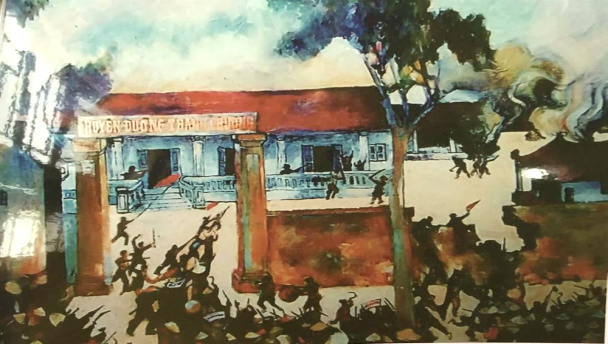
Early in the morning of September 1, 1930, more than 20,000 Thanh Chuong people marched to the district capital. The revolutionary masses burned down the district office, released political prisoners, and carried out their own demands. As the "rear commander" (the commander at the back of the group), comrade Doanh contributed to leading the masses to victory.
The development of the revolutionary movement requires young, daring and resourceful cadres. At the District Party Congress, Tran Huu Doanh was elected as a member of the Party Executive Committee (official), in charge of propaganda and agitation work.
Having little experience in Party work, only enthusiasm, now being entrusted by the Party organization with a heavy task, Tran Huu Doanh raised his sense of responsibility, devoted all his mind to worrying about how to bring the Party's voice to the working masses. The District Party Committee was newly established, the financial base was still poor, but relying on the help of the people, he carried out the Party's propaganda work well. The District Party Committee's propaganda agency published the newspaper "Countryside". The newspaper was lithographed on rough paper, with more than 20 copies published each issue, denouncing the crimes of imperialism and feudalism, encouraging the people's fighting spirit, and popularizing the Party's policies.
Comrade Doanh was both the editor-in-chief, wrote articles, found printing places, and brought newspapers to each Party cell. Lacking money to buy stone and paper, he went to each village to both propagate and do financial work for the Party. Sometimes, lacking money and not having time to go to places to collect donations, he went back to his family to ask for money to buy stone and paper. The "Countryside" newspaper was the first propaganda agency of the Thanh Chuong Party Committee. The newspaper both guided the masses in their struggle when the movement was developing strongly and guided the masses in building a new regime and a new cultural lifestyle.
At the end of 1930, the Central Party Committee organized a congress to study the "Political Platform" of the Party Central Committee, review the general situation and propose immediate tasks. Tran Huu Doanh was appointed by the Thanh Chuong District Party Committee as a delegate to attend the Congress. In early January 1931, he was appointed by the Nghe An Provincial Party Committee as Secretary of the Thanh Chuong District Party Committee.
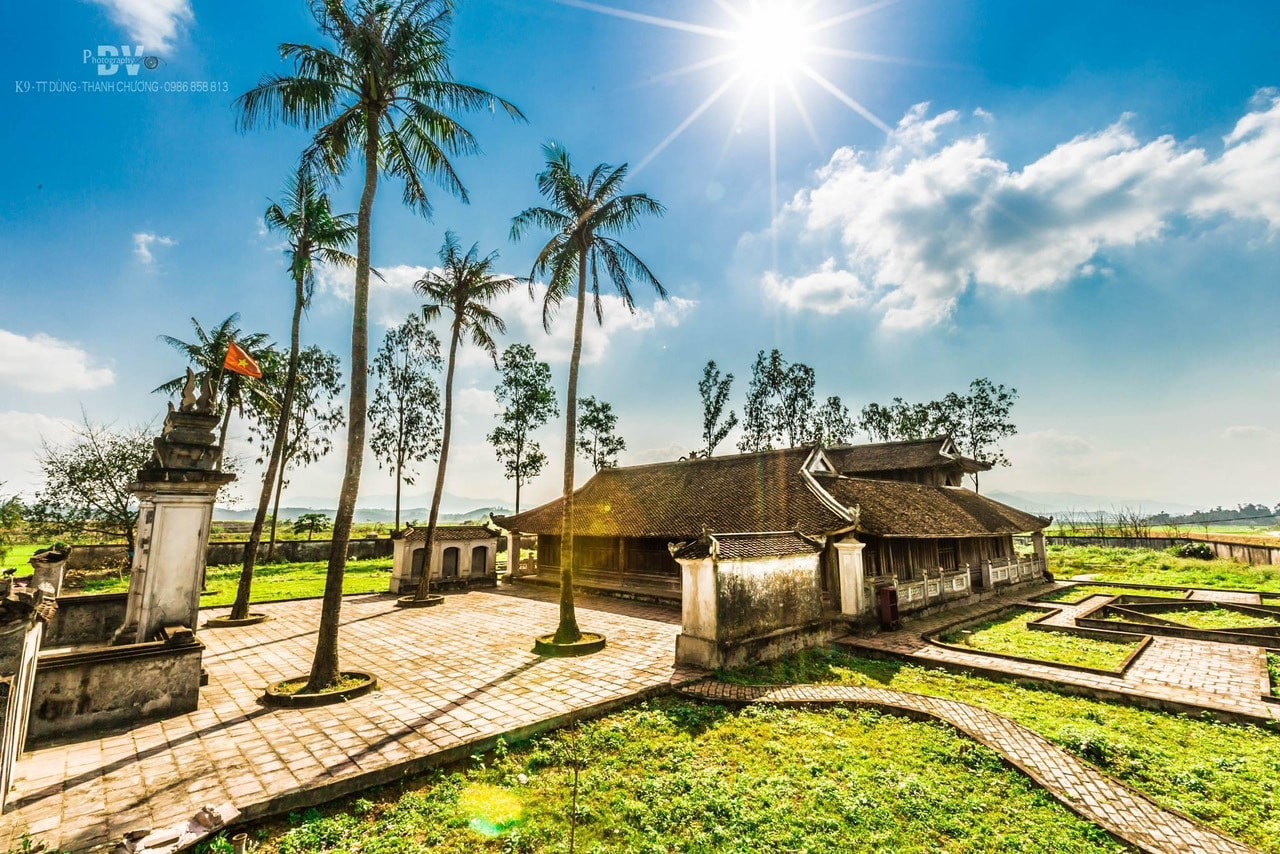
Tran Huu Doanh took on the responsibility of being the leading cadre of the district Party Committee when the revolutionary movement in the district and the province was facing great difficulties and challenges. The imperialists and feudalists concentrated their forces to fiercely suppress the Party bases and Soviet villages. How to maintain contact with superiors, with the General Committees and Party cells? How to avoid losses for the Party and the movement? How to maintain unity within the Party and avoid stumbling blocks? These questions burned in Tran Huu Doanh's mind day and night. Under the light of the Political Platform and the Resolutions of the Central Region Party Committee, based on the direct guidance of the Nghe An Provincial Party Committee, Tran Huu Doanh demonstrated the noble qualities and talent of a grassroots leader in the most difficult and challenging moments.
In the first months of 1931, the struggle between us and the enemy was fierce and intense. Among the local revolutionaries, there was a small group that wavered, and some individuals surrendered and betrayed. Tran Huu Doanh remained calm and steadfast in leading the District Party Committee to strictly, correctly and creatively implement the Party's major policies. For those who made mistakes, he resolutely fought without compromise. The District Party Committee office was sometimes located in a Soviet village, and sometimes had to retreat to the edge of the forest. Comrade Doanh was rarely at the office but often stayed close to the Party cells, promptly and closely directing the District Party Committee's policies. He had the initiative to bring his colleagues and cadres from the District Party Committee office to the Party cells, directly leading the masses in the struggle.
In April 1931, Tran Huu Doanh was transferred to work at the Nghe An Provincial Party Committee. Shortly after, he was added to the Provincial Party Committee Executive Committee, doing both propaganda and financial work for the Party. He did not hesitate to do anything, from writing leaflets, printing documents to going to Party bases, consolidating secret Party cells, meeting families sympathetic to the revolution to mobilize finances for the Party.
Living surrounded by the enemy for months, sometimes 3 or 4 people had to share a piece of dry, moldy rice cake, "which was a piece of cake used to replace long-stored jelly", sometimes having to eat wild tubers for weeks, but the comrade was still optimistic and loved life. He often gave his small rice and potato rations to other comrades in the agency. For sick and weak brothers and sisters, he took care of them wholeheartedly. When being hunted by the enemy, he carried his comrades through one forest after another, sometimes so tired that he thought he could not walk, he still persevered to climb passes and mountains with the entire agency to a new place of residence. Until the first months of 1932, the communication between Nghe An Provincial Party Committee and Central Region Party Committee was interrupted, he still took the initiative with some comrades to write leaflets to some localities to rekindle the Party base. In February 1932, comrade Doanh returned to Luu Son to establish Anh Thanh Party cell, one of the last cells of the two Thanh Chuong and Anh Son Party cells during the 1930-1931 peak.
March 1932,Le Xuan Dao- the leader and close comrade of Tran Huu Doanh sacrificed. That was a great loss for Nghe An Provincial Party Committee. Comrade Doanh persistently encouraged his comrades to maintain the revolutionary spirit. He planned to cross Truong Son with some remaining cadres of the Provincial Party Committee, temporarily take refuge in Siam and then find an opportunity to return to work. But that plan had not been implemented when on June 6, 1932, Tran Huu Doanh and all cadres in Nghe An Provincial Party Committee were caught in the enemy's net.
Having captured Tran Huu Doanh, the last leader of the Nghe An Provincial Party Committee during the 1930-1931 movement, the enemy hoped to exploit many important contacts of communist bases in the region. They took Tran Huu Doanh to Thanh Chuong district office for "identification". Here, he cursed the district chief in the face and refused to admit anything that they had falsely accused him of.
At Thanh Chuong district headquarters for 1 day and night, Tran Huu Doanh was taken by the enemy to Vinh prison. The chief spy Bi-e and Ton That Hoi tried every way to coerce and entice him, but he resolutely resisted. Unable to subdue Tran Huu Doanh, the enemy classified him as a serious criminal, sentenced him to life in prison, and exiled him to Lao Bao.
On the long journey from North to South, among the group of political prisoners with heavy sentences, there were 3 brothers of Tran Huu Doanh (biological elder brother Tran Oanh and biological younger brother Tran Huu Quan). All 3 brothers were sentenced to life in prison, exiled. Meeting the second and youngest brothers in a difficult situation, Tran Huu Doanh was not discouraged. He still smiled happily, still found ways to encourage his blood relatives to maintain their integrity, to continue the new fight.
For more than 10 years, having experienced 3 hells on earth, comrade Tran Huu Doanh has increasingly shown the noble qualities of a revolutionary cadre. He actively participated in the struggles of the political prisoners. There was a time when he shouted for nearly 45 days. When the enemy terrorized him, Tran Huu Doanh asked to lie outside, in the outer circle, to receive the beatings instead of the other comrades.
The harsh life in prison weakened Comrade Doanh's body. Although he suffered from chronic malaria and was thin and pale, he still tried to train and study. During the days he participated in leading the revolutionary movement in Thanh Chuong, he was a young, energetic, and sharp cadre. In prison, he had the opportunity to meet many provincial leaders gathered here. Seeing it as a rare "lucky opportunity", Tran Huu Doanh took the opportunity to study Marxist-Leninist theory and experience in Party work. He also learned carpentry and blacksmithing. Tran Huu Doanh was most enthusiastic about the lessons on revolutionary armed forces and guerrilla warfare.
In December 1942, Tran Huu Doanh was assigned by the prison party cell to escape with Truong Van Linh, Chu Hue, and Nguyen Tao. As soon as they left the prison, the comrades were discovered and chased by the enemy... The four comrades helped each other run into the forest and from there began an extremely arduous journey from the Central Highlands to Nghe An. On the way back home, the comrades discussed plans to continue rebuilding the Party base, mobilizing the masses to fight, and organizing a revolutionary base. Among the four comrades who escaped from prison, two comrades, Truong Van Linh and Tran Huu Doanh, were often tormented by sudden fevers, but they still walked, crawled, and dragged themselves from one forest to another...
On the 18th day, all four comrades got lost. Truong Van Linh and Nguyen Tao took a different route, while Tran Huu Doanh and Chu Hue followed the Buon Ma Thuot - Tam Ky route to Hue and then back to Nghe - Tinh. On the evening of the 30th of Tet that year (January 1943), Tran Huu Doanh returned to Cat Ngan.
Escaping the fierce tigers of the deep forest and encountering the network of secret agents, village chiefs, and village militia, Tran Huu Doanh had to decide everything himself, organize a base for his activities. Knowing that his body was weak, his skin was torn and black, his legs were swollen, his eyes were dark, and if he returned home immediately, he would be easily discovered by the enemy, so he went to the house of Mr. Tran Van Khue, a mass base from 1930-1931 in Tho Son to take refuge.
To create a long-term operation, Tran Huu Doanh disguised himself as a merchant, selling tobacco, honey, and forest products. With a felt hat on his head, a thick mustache, and a voice that was half Northern, half Central, he passed through many French, Japanese, and village patrol stations. In the areas of operation from the Soviet period of 1930-1931, Tran Huu Doanh restored a number of bases in Thanh Chuong and Anh Son districts. He advocated first building bases and educating the masses, even if he could not yet contact the Party, it was still to prepare the basis so that when other comrades were released from prison, they would have a place to operate.
During the two years of 1943-1944, in addition to some old bases in Cat Ngan, Do Luong, Thanh Chuong, he built a base in Vinh Giang, Tra Na, gathered a number of patriotic youths, initially instructed them on how to mobilize the masses, how to fight guerrilla warfare, and build bases against the Japanese and French. His deep belief in the inevitable victory of the revolution had the effect of motivating and attracting those around him. Even some former political prisoners, because of family obligations and fear of terrorism, were content to do business, but now encouraged by comrade Doanh, they "threw up the blanket" and returned to activities.
By many means, taking advantage of every possible situation, he restored and further developed a number of revolutionary mass bases and a number of loyal mass groups.
He often went far away, for a long time, sometimes for three or four days, sometimes for half a month, then returned to Cat Ngan. The local chiefs caught wind of Tran Huu Doanh's activities, so they informed the Do Luong secret police to come and arrest him. But with the wholehearted protection of the masses, comrade Doanh continued his activities. As for the Cat Ngan chiefs, he went to each of their homes, used arguments to clearly show the victory of the revolution, and prevented them from continuing to commit more crimes against the revolution and the people.
During the days back home, every night, Comrade Doanh went to the homes of the mass bases to try to stir up revolutionary traditions and expose the crimes of the Japanese invaders. He often dreamed of how to make contact with the Party, build revolutionary bases, mobilize the masses to fight armed, drive the Japanese and French out of the country, and regain power for the people.
Comrade Tran Huu Doanh's dream had not yet come true when, on the night of April 5 (February 23 of the lunar calendar) in 1945, on the way from Vinh Giang - Tra Na base to the forest below Truong Dong in Giang Son commune, he sacrificed his life because he stumbled upon a group of French soldiers coming from Vinh.
Remembering comrade Tran Huu Doanh, a revolutionary mass cadre and party member from 1930-1931 in Nghe Tinh, fellow inmates in Vinh, Buon Ma Thuot, and Dak Min prisons remember an outstanding son of his homeland, a young communist soldier who quickly absorbed Marxism-Leninism, who had the merit of kindling one of the first bases of the Nghe An Party Committee, one of the steadfast leaders of the Thanh Chuong Party Committee, of the Nghe An Party Committee in the most fierce days, a close comrade who devoted his whole life to the glorious revolutionary cause of the Party.

